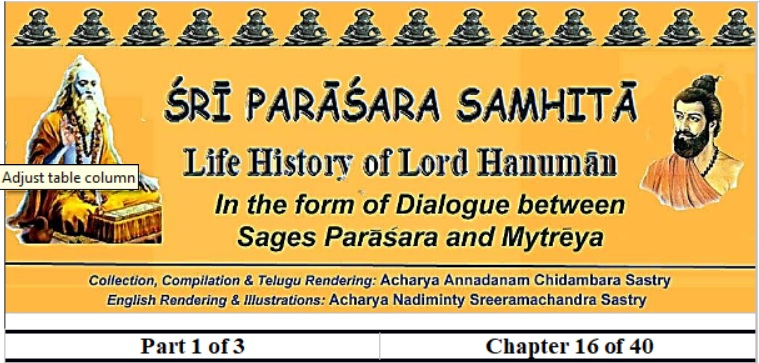
16th Chapter (Caturdaśa Paţalah)
“Power of the 8-lettered Mantra – The Story of Vijaya”
(Aşţhākşrī Prabhāvah – Vijayacaritamm)
श्रीमैत्रये :
श्लोक:
गत्वातु विजयस्तत्र किंबुद्धिरभवन्मुने
पराशर महाप्राज्ञ! तद्वृत्तं वक्तुमर्हसि।। 1
Mytrēya:
“Oh! All-knowing sage Parāśara! Please do tell me the aspects of Vijaya’s thoughts and deeds after he entered his city”. (1)
श्रीपराशर:
विजयो गृहमासाद्य प्रजाधर्मेण रंजयन्
भुंजानस्सकलान्भोगान् बहुकालं निनाय स:।। 2
Parāśara:
“Mytrēya! After reaching home, Vijaya kept his people contented and happy by ruling the kingdom righteously and he himself remained happy for a long time. (2)
राजा हनुमदादेशाज्जिुघृक्षुरपरां तनुम्
सुखतामपि पूर्वांतु मेने भारमिवात्मना।। 3
Vijaya’s Rebirth
By the command of Lord Hanumān, Vijaya was always thinking of going to next birth and form, and considered the current birth a burden, even though he was having a very happy life. (3)
ततो हित्वा तनुं पूर्वां विजयो जयकांक्षया।
पांडुपत्न्यां पृथायांतु लेभे देवेन्द्रपुत्रताम्।। 4
Ultimately, victory desiring Vijaya left the old body and took birth- form as the son of Dēvēndra to Kunti, wife of the king Pāndu. (4)
यस्याग्रजो महाराजस्सत्यसंधो युधिष्ठिर:
तदग्रजो भीमेसन: भीमकर्मा महाबल:।। 5
His eldest brother Dharmarāja (Yudhiştir) in this birth was the sovereign and a speaker of only the truth. His second elder brother was the mighty Bhīmasēna (also a son of the Wind God), who is capable of performing frightening deeds. (5)
तस्यानुजस्तु विजयो ववृधे मातृसन्निधौ
स एवार्जुननाम्ना सौ जगृहे सकला: कला:।। 6
Vijaya, born after Bhīmasēna, grew up at his mother. It is he, under the name of Arjuna became an expert in all arts. (6)
कदाचिद्विजयो राजा जगदेकधनुर्धर:
प्राचीदिशमगात्पूर्वं जिगीषुस्सपरिच्छद:।। 7
Once Vijaya, the best valorous one in the world, intending to win all the (kingdoms) in all the directions, moved towards the East along with his forces. (7)
प्राचीनान्शत्रुसामंतान् जित्वा भुजबलेन स:
अनुयातस्तु तैर्भूपै: प्रपेदे दक्षिणां दिशम्।। 8
Winning all the subordinate kings in the East with his might, he moved to the South along with them. (8)
दाक्षिणात्यान्रिपून्राजा प्रोत्सार्य च गुणस्वनै:
सेतुं ददर्श विजय: सूतसंस्तुतविक्रम:।। 9
Vijaya-Arjuna and the Rāmasētu
Winning over the enemy kings in the South just by the sheer vibration sound of his bowstring, praised by yjr sage Sūta for his valour, Vijaya saw the bridge (the famous Rāmasētu across the Gulf of Mannaar). (9)
किमेतदिति पप्रच्छ मंत्रीन्वृद्धान्पुराविद:
तैरूचे विजयोराजा सेतुदर्शनविस्मित:।। 10
Surprised to see such a strong bridge Vijaya asked the elderly in his entourage, ‘What is that?’ They answered as follows. (10)
राजन् रघुपती रामो रावणस्य दुरात्मन:
वधाय बंधयामास समुद्रं पर्वतोत्तमै:।। 11
“Oh! King! Srīrāma, the best scion of the Raghu clan, built this with large boulders and mountains across sea (to reach Lanka) to kill the unrighteous Rāvaņa. (11)
शतयोजनपर्यंता सेयं सेतुरिवांबुधौ
इति मंत्रिवचश्श्रुत्वा जहास विजयो नृप:।। 12
Vijaya’s Pride
This is a bridge across 800 km (100 yojana) expanse of sea”. Hearing this Vijaya, the king smiled. (12)
स्वयं धानुष्कतां प्राप्य शराणामपि संपदम्
किमर्थंमन्वभूद्राम: प्रयासं रघुनन्दन: 13
‘Why did the Raghu Lord has undergone through all this exertion, when he himself is a renowned archer and possessed a treasure trove of wonderful arrows? (13)
शरपंजरबंधेन सुतरो यं तु सागर:
प्रयोजनं न जाने स्य प्रयासस्य महात्मन:।। 14
I do not understand the usefulness of such a great effort, when that great soul (mahātma) could have easily made a mesh of arrows as bridge to cross the sea’. (14)
अथास्मिन्नन्तरे श्रीमान् हनुमान्मारुतात्मज:
रामवृत्तांतविज्ञानादाजगाम कृतांजलि:।। 15
At that moment son of the Wind God, rich in everything (Srīmant), Hanumān, came there with folded hands, because He knows Srīrāma’s whole story. (15)
अब्रवीन्मारुतिर्भूपं गर्बांधतमसावृतम्
यदुक्तमधुना राजन् भवता हेलयावृतम्।। 16
Hanumān’s View Point
Hanumān said so to the king (Vijaya) covered in the darkness of pride, ‘Oh! King! What you are saying now is totally not true. (16)
आपातरमणीयत्वात्तन्नक्षोदक्षमंवच:
ऋक्षवानरमुख्यास्तु महापर्वतसन्निभा:
शरपंजरमार्गेण तरेयुर्जलधिं कथम्? 17
Though the words may sound nice, they do not stand critical analysis. How mountain-sized bears and monkeys can cross the sea on a mesh of arrows? (17)
शकुन्तपातमात्रेण भिद्यते शरपंजर:
एतादृशंतु पंथानं श्रद्धधातु कथं जन:।। 18
A bridge made of a mesh of arrows will break even just when a bird settles on it! How people can have belief in such a path. (18)
पिपासोरधिकं जंतो: पिधाय मधुरोदकम्
मरीचिकातोयमिव भवेत्पंजरपद्धति:।। 19
This method of building a bridge of arrows seems similar to offering to thirsty person water in a mirage. (19)
अथवा जानकीनाथो ममस्वामी रघूद्वह:
अविमृश्य कथं कुर्यात् वृथालापैरलं तव।। 20
Otherwise, how the best among the Raghus, my Lord Rāma could perform deeds that never faced criticism? Stop your purposeless talk? (20)
अर्हत्येष समारोहं यदि वा शरपंजर:
गजवाजिरथोपेतां तथा सेनां वहिष्यति।। 21
Yes. If your arrow structure can bear my weight, it might bear weight comprising of elephants, horses and chariots’. (21)
इत्युक्त: कपिनाथेन नृपो वचनमब्रवीत्
बध्यते जलधिर्धीर: मया सायकपंजरै:
शिथिलीकुरुतां तत्तु प्रसभं शरपंजरम्।। 22
Vows of Hanumān & Vijaya
So told by Hanumān, Vijaya said so to him. ‘Oh! Resolute soul! I am building a bridge across the sea with arrows. Try to break it down! (22)
दृढगत्या यथाशक्ति घावनेन जवेन वा
येन केनापि योगेन शिथिली कुरु पंजरम्।। 23
You can break it by walking with your might or running fast with all your force or in any other way. (23)
समय: क्रियते सौम्य: मया निश्चलबुद्धिना
भिद्यते शरबंधो यं भवता यदि मारुते
तदा सद्य: प्रवेक्ष्यामि सगांडीवो हुताशनम्।। 24
Gentleman! With a balanced mind, I take a vow that, if you can break the mesh of arrows built by me, I will enter into fire along with my famous bow gāndīva’. (24)
इत्युक्त्त्वा शरजालेन वबन्ध जलधिं नृप:।। 25
Then Vijaya built a bridge across the sea with arrows. (25)
कपीन्द्रो पि तदा दृष्ट्वा शरबन्धं तधाविधम्
राजानमब्रवीद्वाक्यं सीताराममनुस्मरन्।। 26
Seeing that arrow-mesh bridge, Hanumān remembered Sītā and Rāma and said to Vijaya thus. (26)
सीतारामपदद्वन्द्वध्यानसंभृतविक्रम:
भंजेयं शरबन्धं ते पदेनैकेन भूमिन:।। 27
‘Oh! King! Thanks to the valour that is the result of my service at the feet of Sītā and Rāma, I can break your mesh of arrows with just one step. (27)
न चेत्तव पताकांको भवेयं विजयोन्मुख: 28
If not, accepting your victory, I will become a symbol-form on the flag of your chariot’. (28)
इत्युक्त्त्वा हनुमान्भूपं प्रहसन्मुखपंकज:
द्वित्रैस्तु पदविन्यासैर्बभंज शरपव्म्जरम्।। 29
Vijaya-Arjuna’s Pride Dented
Still smiling, as he was talking to the king, Hanumān casually broke the arrow-mesh bridge taking just two steps. (29)
दृष्ट्वा पव्म्जरभंगंतु निर्विण्णवदनो नृप:
गांडीवं पातयामास किमेतदिति विस्मित:।। 30
Ashen-faced on seeing the broken arrow-mesh bridge, astonished Vijaya threw away his mighty bow gāndīva. (30)
निनिन्द बहुधा त्मानं गाण्डीवं च पुन:पुन:
अथ चिंतां समापेदे विजयो जयनिस्पृह:।। 31
Blaming self and his bow gāndīva, Vijaya worried greatly about the likely fate of his planned victories. (31)
अद्यप्रभृति मच्छक्तेरवसादो थवा ननु
रक्षोमायाथवानूनं स्वप्नो यमथवा पुन:।। 32
‘Have my powers left me from this moment onwards? Or is this an occult deed of demons? Or is it a bad dream? (32)
यदि वा मम दिड्मोह: बुद्धिभ्रंशो पि वा पुन:
अन्यथा कथमेतत्तु विपरीतं महद्भवेत्? 33
How this catastrophe could occur unless I got stunned or my mind became perverted?’ (33)
इति संचित्य मनसा सहसा नृपनायक:
प्रज्वाल्य पावकं तत्र प्रवेष्टुमुपचक्रमे।। 34
His mind engrossed in such thoughts that good king Vijaya set up fire there itself and prepared to enter into it along with his bow. (34)
अथास्मिन्नंन्तरे कृष्ण: पाण्डवानुजिघृक्षया
तं देशमागमत्तूर्णं निरस्तान्यप्रयोजन:
आगत्य वासुदेवस्तु पप्रच्छ हनुमन्नृपो।। 35
Srī Kŗşņa Intervenes
At that moment, intent on protecting the son of Pāndu, leaving all his other affairs aside, Lord Srī Kŗşņa came there and questioned Hanumān and Vijaya in this manner. (35)
युवाभ्यां किंकृतं धीरौ वद तं मे नियुंजत:
किमर्थं ज्वलितोवह्नि: भग्नोवा शरपव्म्जर:।। 36
‘Oh! Self-controlled ones! Answer my questions regarding what you two are going to do. Why this fire was set up? How this arrow-mesh bridge got broken?’ (36)
तावबू्रतां यथावृत्तं कृष्णस्य परमात्मन:
श्रुत्वा निगदितं ताभ्यां प्राह तौ गरुडध्वज:।। 37
Both of them explained the events as they happened to the God Srī Kŗşņa. Hearing their narration, the eagle-flag holder Srī Kŗşņa said so (37)
असाक्षिकमिदंकर्म कृतवंन्तौ कथं युवां?
शरपव्म्जरसंस्थानं कीदृशं भवताकृतम्।। 38
‘How did both of you undertook this action without any witness? How did you (Vijaya) manage to build an arrow-mesh bridge? (38)
त्वया वा शरबन्धस्य विश्लेष: कथमाहत:
पश्येयं युवयो: कर्म पुनरेव विधीयताम्।। 39
How was that arrow-mesh bridge damaged by you? I have to see your actions again. Show me.’ (39)
श्रुत्वा कृष्णवचस्तत्र पांडवो ह्रदयप्रियम्
बवन्ध जलधिं तूर्णं पुनरेव शितैश्शरै:।। 40
Scene Recreated
Hearing the pleasant words of Srī Kŗşņa, Vijaya again built a bridge across the sea with his sharp arrows. (40)
ततो हरिस्तु सर्वात्मा सर्वभूतदयापर:
अधस्ताच्छरबन्धस्य प्रविष्ट: कमठाकृति:।। 41
Then Srī Kŗşņa, resident of every soul and merciful towards every living creature, went below the arrow-mesh bridge in the form of a tortoise (Kūrma incarnation of Lord Vişņu) to support it. (41)
हनुमानपि सन्नद्ध: शरपंजरभंजने
आरुरोह शरारोहं पंजरीकृतनिग्रह:।। 42
Intent on breaking that arrow-mesh bridge, Hanumān warmed up and strode on to the bridge. (42)
अवष्टभ्य पदद्वन्द्वम् यथाशक्ति स मारुति:
अधोनिनीषया तूर्ण्ं चालयामास पंजरम्।। 43
He started pressing the bridge strongly with his feet and shook it well. (43)
तथापि दढसंस्थानान्नचचालेषुसंहति:।
धावतिस्म ततश्शीघ्रं मारुति: शरवत्त्र्मना।। 44
Even then, thanks to a strong base (tortoise!), nothing happened to the bridge. Then Hanumān ran fast over the bridge. (44)
तथापि न चकंपे सौ कूर्मावष्टंभवैभवात्
उड़ीयोड़ीय वेगेन न्यपतत्पूतविक्रमै:।। 45
But, because the form of the great tortoise is there as the support, nothing happened to it. Helped by his pious valour, Hanumān took great big forceful leaps on it. (45)
तथापि शरसंघात: किंचिन्नैवाप वैकृतिम्
दुष्करप्रतिघातस्य स्ववीर्यस्य जगत्त्त्रये
अपूर्वप्रतिघातेन बन्हमन्यत सो र्जुनम्।। 46
Even then, that arrow-mesh bridge did not lose form even by an iota. Since His peerless valour was found a worthy opponent, Hanumān praised Arjuna (Vijaya) greatly. (46)
हनूमत्पदविष्टंभजर्जरीकृतचर्मण:
कमठेश्वरपृष्ठाग्रात्सुस्त्रवासृड्न्दीतत:।। 47
The back of the tortoise was severely bruised by the powerful feet of Hanumān and blood started flowing like rivers. (47)
अथांजनासुतश्श्रीमान् निजविक्रमवक्रताम्
असृड्मयं जलंचापि निरीक्ष्यावरुरोह स:।। 48
Then the Son of Añjana – Hanumān – climbed down the arrow-mesh bridge as his valour was dented and the water became blood stained (and understood the truth). (48)
कपीन्द्रो भक्तवात्सल्याद्वरदानात्स्वयं पुरा
लक्ष्मीशपक्षपाताच्च निवृत्त: शरभंजनात्।। 49
Out of affection for His own devotee Vijaya, to whom He Himself gave boons, and His own devotion to Lord Vişņu, Hanumān stopped His efforts to break that bridge. (49)
स्वभक्तं विजयं वीक्ष्य संप्रह्नष्टमनाभृशम्
पराजितो हमस्मीति बभाषे वायुनंदन:।। 50
Hanumān, looking at his devotee Vijaya affectionately and happily, said, ‘I am defeated. (50)
राजन् त्वमपि मद्भभक्तो विजय: पूर्वजन्मनि
मन्मंत्रजपनिष्णातो निष्णातो नित्यकर्मसु।। 51
Oh! King! In your previous birth as Vijaya, you recited my mantra, You became dear to me by your daily good deeds. (51)
दिग्जिगीषु: भवान्सद्यस्सत्वरं सर्वविग्रह:
सत्वंमयासुनीतस्सन् भाविकार्यवशाद्भृशम्
निवृत्तो विजिगीषातस्तदानीं नृपनंदन:।। 52
Oh! King! You were then leaving fully prepared to win (lands in) all directions; but, agreeing to my explanation of your future duty, you withheld your then desire of conquest. (52)
इदानीं समयोराजन्विजेतुं सकलादिश:
अद्यप्रभृति शत्रुभ्यो नस्यात्तवपराभव:।। 53
Oh! King! This is the time to win (lands in) all directions. From today onwards, you will never be defeated by any enemy. (53)
दुर्भरो यं महाभारो मद्भभक्तस्य पराभव:
ससरित्सिन्धुशैलाभूर्नमे भाराय कल्पते।। 54
I cannot bear the belittlement of my devotees. That (for me) is heavier than the Earth with all her rivers, seas, mountains and others. (54)
वरदानंप्रतिज्ञातुं विजयार्जुनजन्मनि
पराजयछलेनाद्य प्राप्नोमि ध्वजचिह्नताम्।। 55
The oath in my that boon was for in your previous birth as Vijaya; you are Arjuna in this birth. In the guise of this defeat I will become the sigm on your flag’. (55)
इत्युक्त्वा वचनं श्रीमान् हनुमान्भक्तवत्सल:
विजयस्य स्वभक्तस्य ख्यातये जगतांत्रये
प्रतिज्ञारक्षणार्थं च लेभे तस्य ध्वजांकताम्।। 56
Hanumān’s Generosity
Saying so, Hanumān, the dear one to the devotees (bhaktavatsala), rich in all good virtues (Śrīmant) intent on making famous his best devotee in the Three Worlds, i.e., Vijaya and to fulfill His own owe, formed himself as Vijaya‘s sign flag (kapidhwaja). (56)
तदाप्रभृति लोकेषु पाण्डवस्सफलोद्यम:
कपिध्वज इति ख्यातिं जगाम जगतांचर:।। 57
From that moment on Arjuna had many a successful campaigns and became famous as the kapidhwaja (with a monkey as his sign on the flag) warrior. (57)
तत: कपिध्वजो राजा स्मयमानमुखांबुज:
कृष्णं निरीक्ष्य पश्यंतं वचनं चेदमब्रवीत्।। 58
Then that happy kapidhwaja king, with a smile on his face, looking at friendly and agreeing Kŗşņa told him so. (58)
कृष्ण! पश्य मम प्राज्ञ भुजवीर्यमनर्गलम्
नमे स्ति त्रिषु लोकेषु प्रतियोद्धा कथंचन।। 59
‘Oh! Kŗşņa! See the irrevocable mighty valour of my shoulders. There is no one equal to me in the Three Worlds. (59)
अजेयो सुरजेतापि हनूमान्शिवनन्दन:
भुजवीर्याज्जितो यस्मात् ध्वजलक्षणतामगात्।। 60
That is because Hanumān the invincible, the destroyer of groups of demons, the One born as an essence of Lord Siva Himself was conquered by the valour of my shoulders as a result of which he became my symbol flag (kapidhwaja)’. (60)
इति गर्वितचेतस्कं पाण्डवं यदुनन्दन:
उवाच वचनं धीमान् तस्यगर्वप्रशांतये।। 61
Seeing that Arjuna turned prideful and, intent on breaking that pride, wise Kŗşņa told him so. (61)
यदा ते विजिगीषा स्यात्प्रतिज्ञापूर्विकार्जुंन:
तदाश्रमातिरेको मे दीयते सुह्रुदात्वया।। 62
Kŗşņa’s Wise Counseling
‘Arjuna! Whenever you feel like taking an oath of victory, I, your friend, has to face a lot of trouble. (62)
प्रणवामो वयं पार्थ! सदा स्वाभीष्टदेवताम्
प्रबलद्वेषिणं जिष्णो संयद्वाचा भवत्विति।। 63
We have to worship our respectful Lords for not allowing enmity and war occurring for you with someone stronger than you. (63)
नृपते समयोत्सेकस्तावको मामकं वपु:।। 64
Oh! Arjuna! Your pride of vow is hurting me more than the hurt caused to my body by the mighty feet of Hanumān. (64)
पश्यराजन्मदीयांगं शोणितात्तत्वगन्तरम्
शिथिलीकृतशल्याग्रं निष्ठ्यूतबहुमेदसम्।। 65
Oh! King! Look at the blood that spread under my skin, see the healing wounds on my body; see the fat emanating from my body. (65)
त्वत्प्रतिज्ञां समालोक्य कूर्मनायकविग्रह:
अधस्तात्पंजरस्याहमवष्टभ्यावतस्थिवान्।। 66
Understanding the implications of your vow, I sat tightly under your arrow-mesh bridge for support in the form of a tortoise. (66)
तदापादप्रहारेण वायुसूनोर्महात्मन:
जर्जरीकृतसर्वांगो बहुसंकटमभ्यगाम्।। 67
With all my body parts beaten into pulp by the force of the feet of that Great Soul and Son of Wind God, I felt very severe pain. (67)
को वा युधि कपीन्द्रस्य स्थाता तिकुपितात्मन:
यत्र वज्रादिशस्त्राणि तूलप्रायाणि जग्मिरे।। 68
Who is capable of standing in war against very angry Hanumān, against whom even great weapons like the diamond strong vajrāyudha (Indra’s weapon) will be like cotton clumps? (68)
किं तु मच्छ्रवेदित्वाद्वरदानात्तु ते पुरा
भाविकार्य प्रभावाच्च ध्वजाग्रे समुपस्थित:।। 69
But, because he observed my suffering, because he once gave you a boon, because he visualized your role in the future happenings, he took the form of your symbol-flag (kapidhwaja), He allowed you to defeat Him’. (69)
इत्युक्त्त्वा तस्य तोषाय प्रशशंस हरि: पुन:
कृतार्थो पि महाभाग! हनूमान्भक्तितोषित:
आस्ते ध्वजपताकायां जयमिच्छन्सदा तव।। 70
Having said so, for Arjuna’s satisfaction sake Kŗşņa praised him. ‘Oh! Great soal! Even though he achieved everything he desired, Hanumān, satisfied with your devotion became you symbol-flag wishing your eternal successes. (70)
इति सांतवचस्सारैस्तदवज्ञां ममार्ज स:
ततो ह्रुष्टमना: पार्थ: कपींद्रध्वजलाभज:
अवशिष्टदिशस्सर्वा: जिगाय भुजविक्रमै:।। 71
Thus, with his gentle words, Kŗşņa removed the ignorance (agñāna) of Arjuna. Then, with a happy heart, Arjuna won over (lands) of all other directions by virtue of the grace of Hanumān being his kapidhwaja and his own might and valour. (71)
इति पवनसुतप्रसादलाभात्
सकलहरिज्जयसंप्रह्नष्टचेता:
अलभत निजमन्दिरं सजिष्णु:
पथि यदुनायकदत्तसूतभाव:।। 72
Arjuna Benefited by Hanumadaştākşrī
Thus, with the benevolence of the Son of the Wind God and Kŗşņa as his charioteer, conqueror Arjuna gladly won over (lands) in all other directions and reached his palace in a happy frame of mind. (72)
अथ सुरपतिसूनुरिद्धतेजा:
सकलदिगीशकिरीटजुष्टपीठ:
चिरमरमतकृष्णया सकृष्ण:
कुरुपतिगौरवभंगहेतुलील:।। 73
Ultimately, with a radiant power, seated surrounded by the crowns of kings galore, in Kŗşņa’s company, he destroyed Duryōdhana’s pride and lived happily for a long time long with Queen Draupadi. (73)
इति श्रीपराशरसंहितायां श्रीपराश्रमैत्रेयसंवादे पव्म्चमुखहनुमन्मंत्रविवरणे हनुमदष्टाक्षरीप्रभाव विजयचरित्रकथनं नाम षोडशपटल:
Thus ends the 16th Chapter, entitled “Power of Aşţhākşrī – History of Vijaya” (Aşţhākşrī Prabhāvah –Vijayacaritamm ) of Śrī Parāśara Samhitā
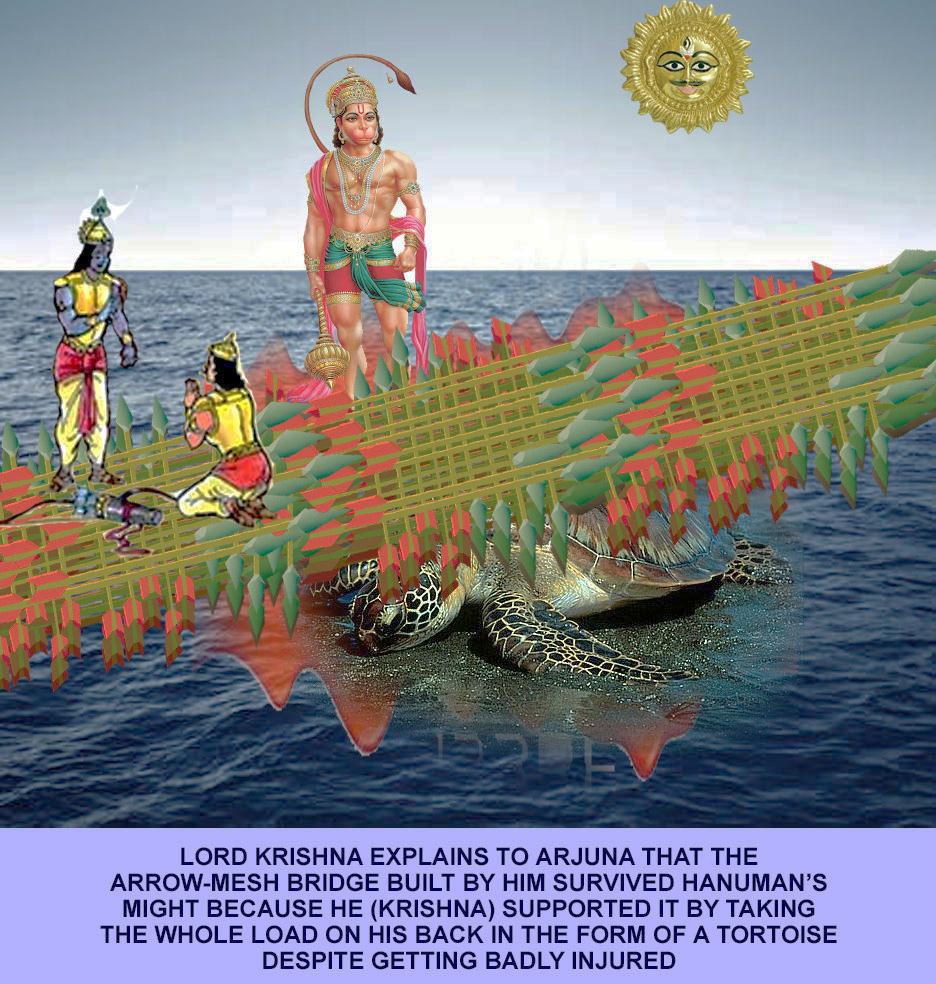
![]()

Click here to visit the Contents of the Part 1.
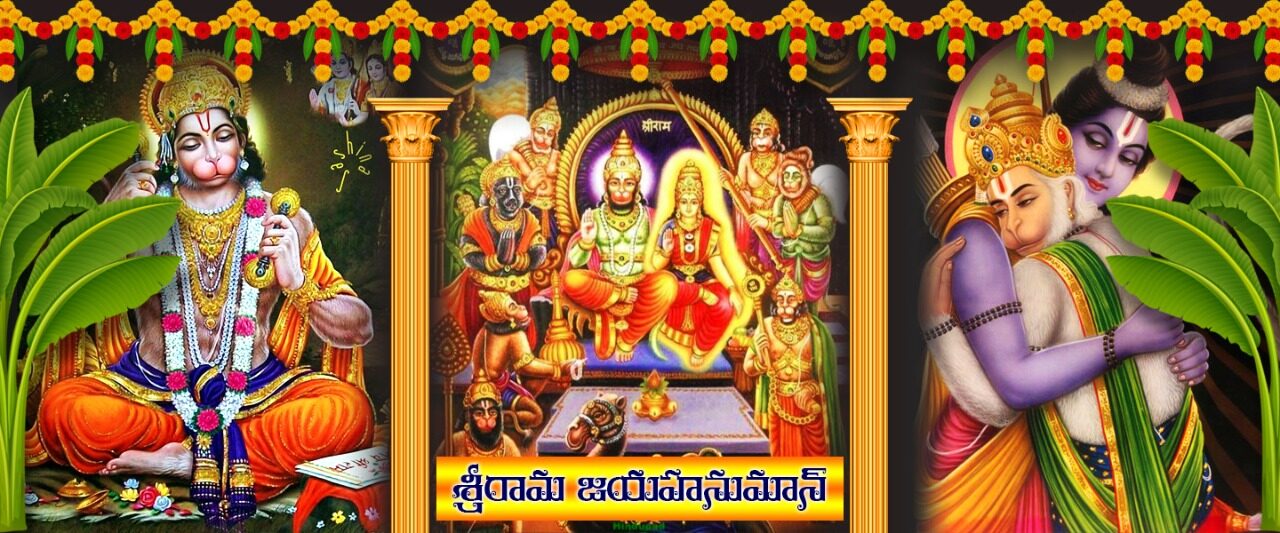



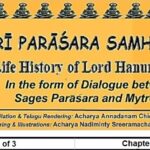
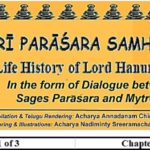
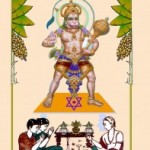
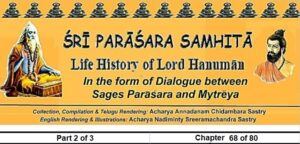
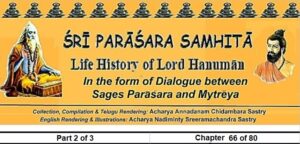
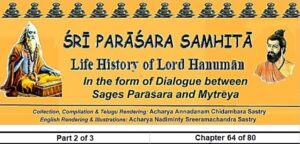
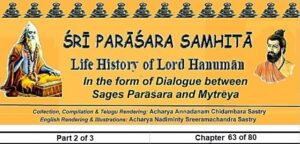
Be First to Comment